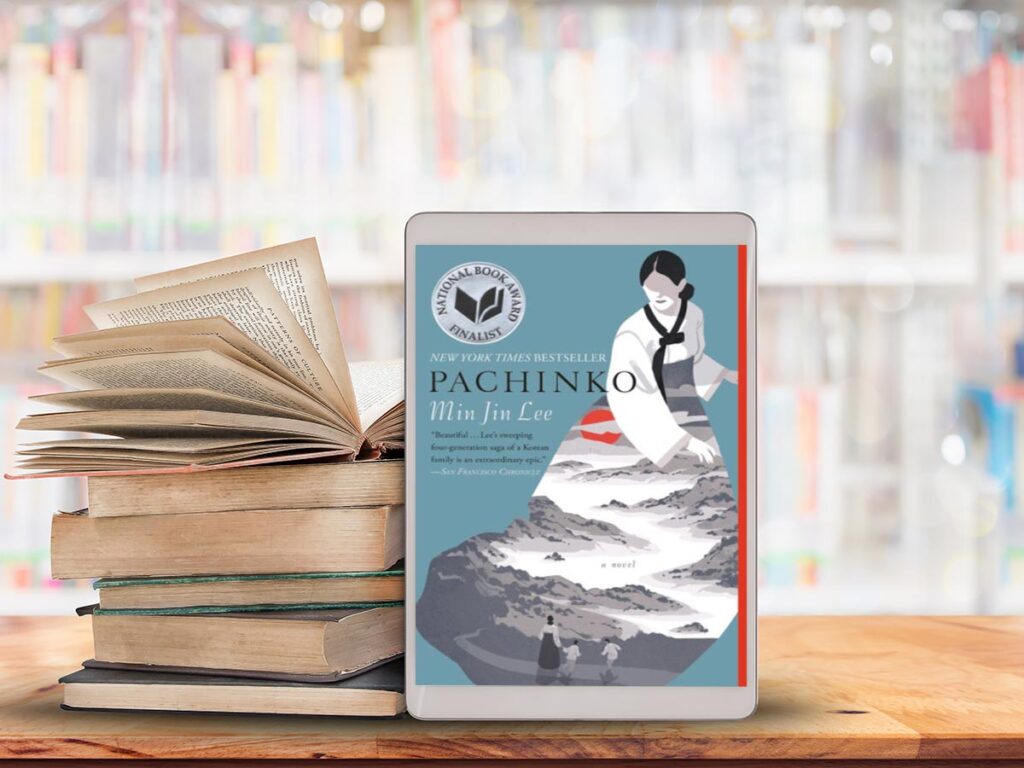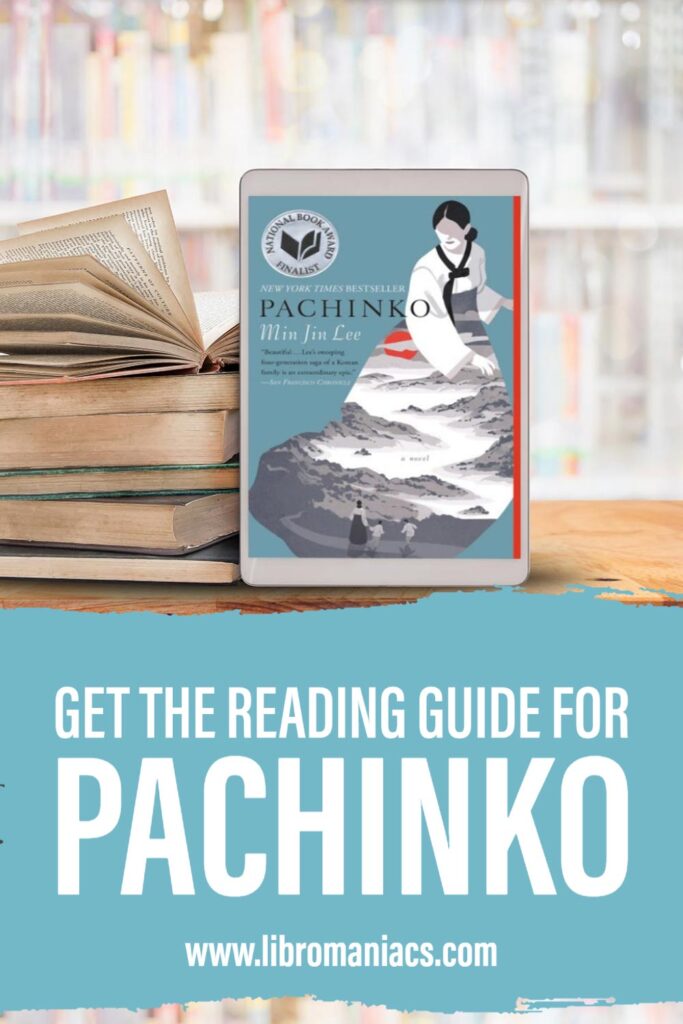Spanning generations and countries, Pachinko follows a family through wars, personal tragedies, coming together, falling apart, and figuring out the importance of identity and origins. Our Pachinko book club questions will help spur on your discussion around these subjects and the novel’s fascinating characters.
The story follows a young Sunja from her origins in Korea with her humble and hardworking parents, to her future in Japan, and the very different lives of her children and grandchildren. This book offers so much for discussion as it follows the characters through political upheaval and their hugely consequential personal decisions, and our Pachinko discussion guide will help you get the conversation started around this deep and expansive story.
This guide includes 10 book club questions, a synopsis of the book and selected reviews– some loved it…others not so much. Keep scrolling because we also suggest three books like Pachinko for further reading.

(This article contains affiliate links. This means that if you choose to purchase, I’ll make a small commission.)
Pachinko Synopsis
Pachinko, Min Jin Lee
“There could only be a few winners, and a lot of losers. And yet we played on, because we had hope that we might be the lucky ones.”
In the early 1900s, teenaged Sunja, the adored daughter of a crippled fisherman, falls for a wealthy stranger at the seashore near her home in Korea. He promises her the world, but when she discovers she is pregnant–and that her lover is married–she refuses to be bought. Instead, she accepts an offer of marriage from a gentle, sickly minister passing through on his way to Japan. But her decision to abandon her home, and to reject her son’s powerful father, sets off a dramatic saga that will echo down through the generations.
Richly told and profoundly moving, Pachinko is a story of love, sacrifice, ambition, and loyalty. From bustling street markets to the halls of Japan’s finest universities to the pachinko parlors of the criminal underworld, Lee’s complex and passionate characters–strong, stubborn women, devoted sisters and sons, fathers shaken by moral crisis–survive and thrive against the indifferent arc of history.
10 Pachinko Book Club Questions
- What do you think about the title of the book? Does the game Pachinko reflect any aspects of this family’s journey?
- The book is long and sprawling. What did you think of the book’s length? If it’s too long, what parts of the book could you have done without?
- “Patriotism is just an idea, so is capitalism or communism. But ideas can make men forget their own interests. And the guys in charge will exploit men who believe in ideas too much.”
Hansu definitely only looked out for his and his own family’s interests, even to the point of cruelty, crime, and greed. How did the political upheaval he lived in mold his world view? - Sexist attitudes and expectations affect the lives of women throughout the book. How is the sexism the women experience similar and different throughout the time periods the book covers?
- “Sunja-ya, a woman’s life is endless work and suffering. There is suffering and then more suffering. It’s better to expect it, you know. You’re becoming a woman now, so you should be told this. For a woman, the man you marry will determine the quality of your life completely. A good man is a decent life, and a bad man is a cursed life—but no matter what, always expect suffering, and just keep working hard. No one will take care of a poor woman—just ourselves.”
This was a common belief of the Korean women in this book. What impact did this have on their lives? Would they have strived for more or made different choices if they believed that they could? - “Because she would not believe that she was no different than her parents, that seeing him as only Korean—good or bad—was the same as seeing him only as a bad Korean. She could not see his humanity, and Noa realized that this was what he wanted most of all: to be seen as human.”
Noa struggled deeply with his sense of identity once he found out who his biological father was. What do you think he was looking for? Did he want a particular identity, or did he want to be free from any labels? - In the early years of her adulthood, Sunja could not stop thinking about Hansu. In the later years of his life, Hansu could not leave Sunja alone. What was it that each of them saw in the other? And what does it say about Sunja that she resisted Hansu…except when it came to providing for her children?
- “It was still hard for a Korean to become a Japanese citizen, and there were many who considered such a thing shameful—for a Korean to try to become a citizen of its former oppressor. When she told her friends in New York about this curious historical anomaly and the pervasive ethnic bias, they were incredulous at the thought that the friendly, well-mannered Japanese they knew could ever think she was somehow criminal, lazy, filthy, or aggressive—the negative stereotypical traits of Koreans in Japan.”
The relationship between the Koreans and Japanese in this time period are complicated to say the least. Did you have previous knowledge of this relationship? Did you learn anything new about Korean and Japanese relations? Are there parallels in your own culture or region?
- The characters in this book have different ideas of right and wrong, what is necessary to survive and what is a step too far. What do you think these ideas are most influenced by? Their upbringing, environment, poverty, or political upheaval? Or some combination?
- Which was the greatest love story in this book?
Selected Reviews for Pachinko
“What a marvelous, deeply engrossing novel about four generations of a Korean family in Japan. There was a lot of story here and a lot of history (of which I was woefully ignorant) and it is all rendered in impeccable prose with a touch of steeliness. Toward the end of the novel, things started to feel a bit rushed, not enough time with the characters. And certain folks just fell away but such is the nature of a sprawling multi-generational novel.”
“I also want to commend Lee for the resilience she imbues her characters with. Despite the persistent sexism and racism they experience, Lee shows how the perseverance of women, the strength within female friendships, and the power of individual action all can create and maintain love within a messed up society. She does not minimize or glorify the suffering her characters face. Rather, with compassion and empathy, she reveals how her characters adapt and strive to thrive and love one another amidst all of their hardships.”
“I could write multiple essays about different parts of this book (e.g., the role and economic implications of pachinko parlors, the tenacity of women and female friendships, the intergenerational transmission of trauma and social status, etc.) but I will just say that a book club could discuss this one for hours and hours.”
“This one was just okay to me. I got some historical context around ethical discrimination in Japan against people originally from Korea, and women’s subservient status in Japanese/Korean society in the first half of the 20th century. Neither the plot nor the writing stood out. Most characters felt over-simplified, with only two primary dimensions: selfish or altruistic, conventional or rebellious. The fact that the two brothers with dramatically different personalities, and without contact for more than a decade, ended up making a fortune in the same pachinko business felt too stereotypical.”
“I was drawn by the buzz, but went into the book and noted down my initial thoughts here without reading any reviews. Having read all GR friends’ very mixed reviews, I share the thoughts on the educational value of the book in history and culture, the sheer number of characters and the lack of depth in most of them.”
3 Books Like Pachinko
If you are interested in more Chinese or Chinese-American characters, try out book club guides for Crazy Rich Asians, Our Missing Hearts or The Many Daughters of Afong Moy. Or if it is more sprawling multi-gen stories you want, how about our guide for The Covenant of Water (Abraham Verghese).
Pachinko was a National Book Award finalist. If you are your club enjoy reading award winners, check out our guides for the National Book Awards, which includes Matrix (Lauren Groff), The Vanishing Half (Brit Bennett) and Between the World and Me (Ta-Nehisi Coates). If you like historical with some war themes, check out our guides for The Rose Code and The Nightingale.

Homegoing, Yaa Gyasi
For another book sweeping across generations, Homegoing is an excellent choice. Following two half sisters whose lives took dramatically different turns during the height of the slave trade in Ghana. The story follows the sisters and their offspring through political turmoil, wars, and the effects of historical forces on the shape of the characters’ personal lives.
Taking place from Ghana to the United States, this book eloquently examines the powerful forces of history and captivity on the self and family.

Please Look After Mom, Shin Kyung-sook
(Chi-Young Kim, Translator)
To explore more of Korean culture and family dynamics, check out Please Look After Mom by Shin Kyung-sook. Set in Seoul, South Korea, the story follows the desperate search for a mother who disappeared in the subway station. While her children and husband search for her, they discover they did not know or appreciate the person she is, and discover her past and present. Through this search we see the reality of life in post-war Korea, and the social expectations of women in that period.

How We Disappeared, Jing-Jing Lee
After her Singaporean village is sacked by the Japanese during a WWII raid, 17-year old Wang Di is taken hostage, shipped off to a military brothel and forced into sexual slavery.
The book has a dual timeline narrative which follows Wang Di during her imprisonment and then decades later as her grandson tries to piece together her story.
“Jing-Jing Lee was inspired by her family’s experiences to write this story. How We Disappeared is a tribute to strong women displaying resilience of spirit even in the most dire of times. It’s about family and seeking the truth.”
Have a listen on Audible. Try audio books for free for 30 days.
Share these Pachinko book club questions with your friends:

